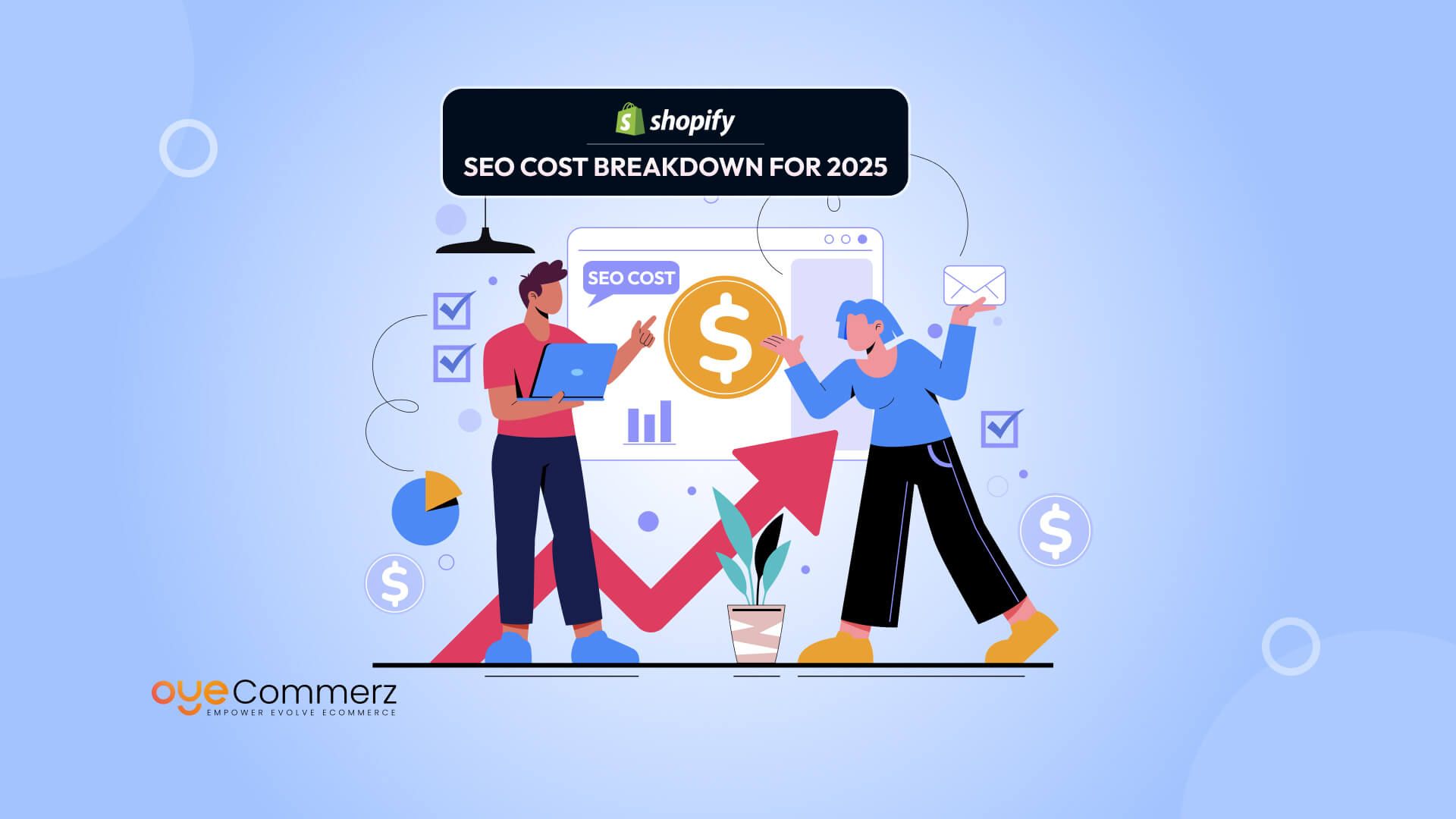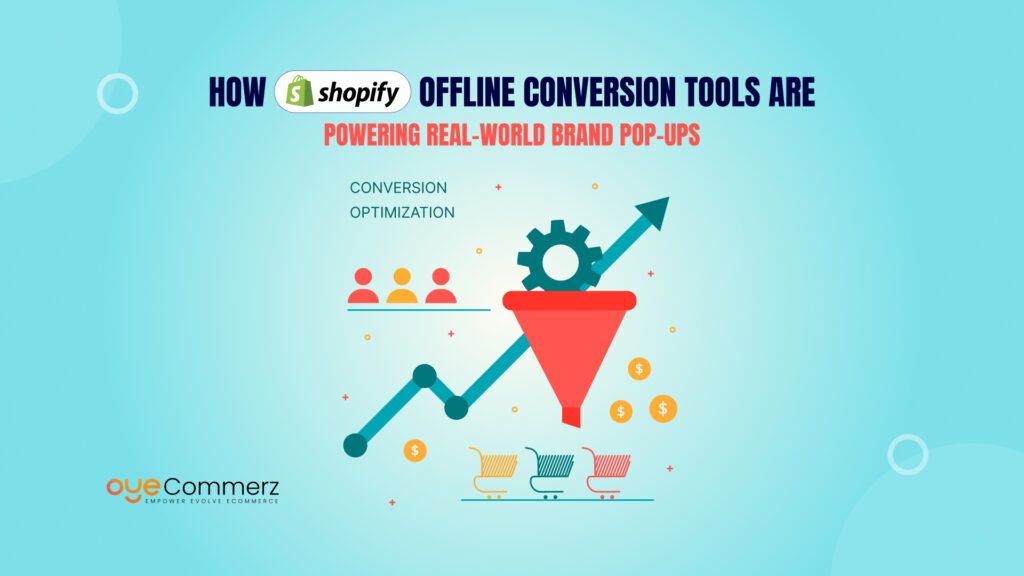Did you know that over 44% of online shoppers begin their buying journey with a Google search?
That means if your Shopify store isn’t optimized for search engines, you’re missing out on nearly half of your potential customers before they even see your products.
SEO (Search Engine Optimization) isn’t just another marketing buzzword, it’s a powerful long-term strategy that helps your store get discovered organically. With the right SEO tactics in place, you can attract high-intent shoppers, reduce dependency on paid ads, and build a sustainable flow of traffic and sales.
But here’s the big question for most store owners:
“How much does Shopify SEO actually cost?”
In this blog, we’ll break down what goes into Shopify SEO, the pricing models, and what kind of budget you should expect whether you’re just starting out or scaling a growing eCommerce brand.
Table of Contents
ToggleWhy SEO Matters for Shopify Stores
Shopify is great, but it doesn’t guarantee traffic
While Shopify gives you all the tools to build and run an online store, it doesn’t automatically bring visitors to your site. Just because your store is live doesn’t mean people will find it. That’s where Search Engine Optimization (SEO) comes in. SEO ensures your store appears in front of potential buyers when they search for products you offer without having to pay for every click.
The Importance of Organic Visibility in a Competitive eCommerce Space
eCommerce is booming, but so is the competition. Every day, new Shopify stores launch, and countless others fight for attention in Google search results. If your store doesn’t show up on the first page of search engines, you’re losing potential customers to competitors who do. SEO helps your site rank higher organically meaning without paying for ads so shoppers can discover your store when they’re actively searching for your products.
Being visible organically builds trust too. Many users skip ads and click on the natural search results, considering them more credible. In short, if you’re not optimizing for SEO, you’re invisible to a huge portion of your target market.
How SEO Helps in Long-Term Growth Compared to Paid Ads
Paid ads can bring in traffic fast but they stop the moment you stop spending. SEO, on the other hand, is an investment in long-term visibility. Once your pages rank well in search engines, they can continue bringing in free, consistent traffic for months or even years.
Think of it this way:
- Paid Ads = renting attention
- SEO = owning attention
With SEO, every blog post, optimized product page, or backlink contributes to a stronger online presence. Over time, your cost-per-customer decreases, and you build a sustainable traffic source that doesn’t rely on ad budgets. That’s especially important for small to mid-sized businesses looking for predictable, scalable growth.
What’s Included in Shopify SEO Services?
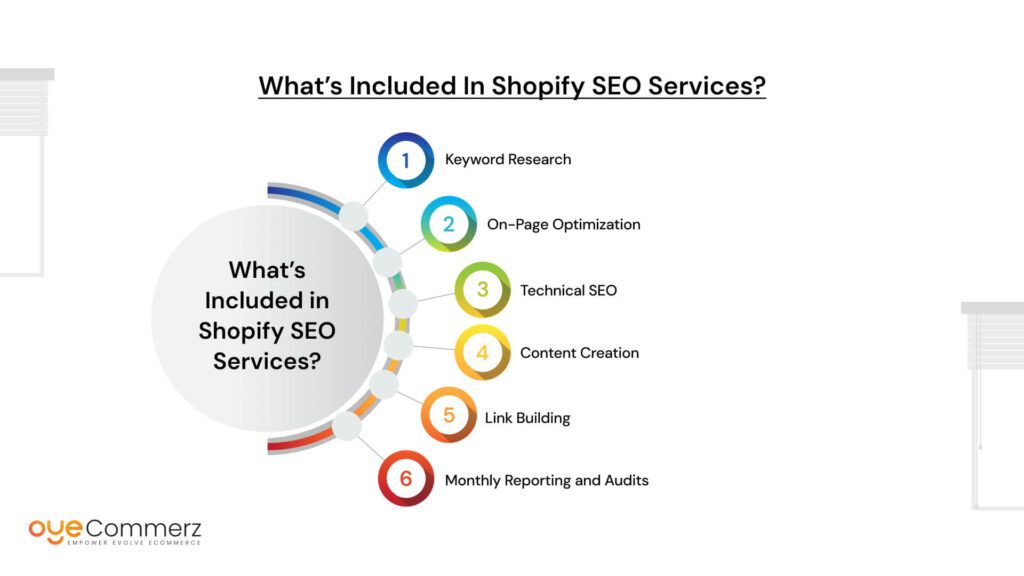
Shopify SEO is a comprehensive approach aimed at improving your store’s visibility on search engines. It goes beyond just keywords; it’s about optimizing the entire site to attract, engage, and convert customers. Here’s what typically comes with professional Shopify SEO services:
Keyword Research
The foundation of any SEO campaign. This involves identifying the terms and phrases your potential customers are searching for. These insights guide content creation, on-page optimization, and overall strategy to target relevant traffic with high buying intent.
On-Page Optimization
Each page of your Shopify store needs to be optimized so search engines can understand it. This includes:
- Writing clear, compelling meta titles and descriptions
- Using proper heading tags (H1, H2, etc.)
- Creating clean URLs and descriptive image alt text
- Structuring internal links to improve user navigation and SEO
Technical SEO
Even a great-looking store can underperform without strong technical foundations. This step ensures your site is:
- Fast-loading on all devices
- Mobile-friendly and responsive
- Free of crawl errors and broken links
- Structured with proper sitemaps and robots.txt files for search engine access
Content Creation
Search engines prioritize useful, original content. SEO services often include:
- Writing optimized product descriptions
- Publishing regular blog posts to capture informational and transactional search queries
- Creating evergreen content like guides, how-to pages, and FAQs
Link Building
Links from authoritative websites help build your domain’s trust and improve rankings. This can involve:
- Outreach to niche blogs and industry publications
- Getting your products mentioned in relevant roundups
- Creating content that naturally earns backlinks
Monthly Reporting and Audits
Ongoing SEO requires tracking and refinement. Monthly reports show what’s working through metrics like keyword rankings, traffic, and conversions. Regular site audits help uncover issues and ensure your store stays optimized as algorithms and competition evolve.
Factors That Affect Shopify SEO Cost
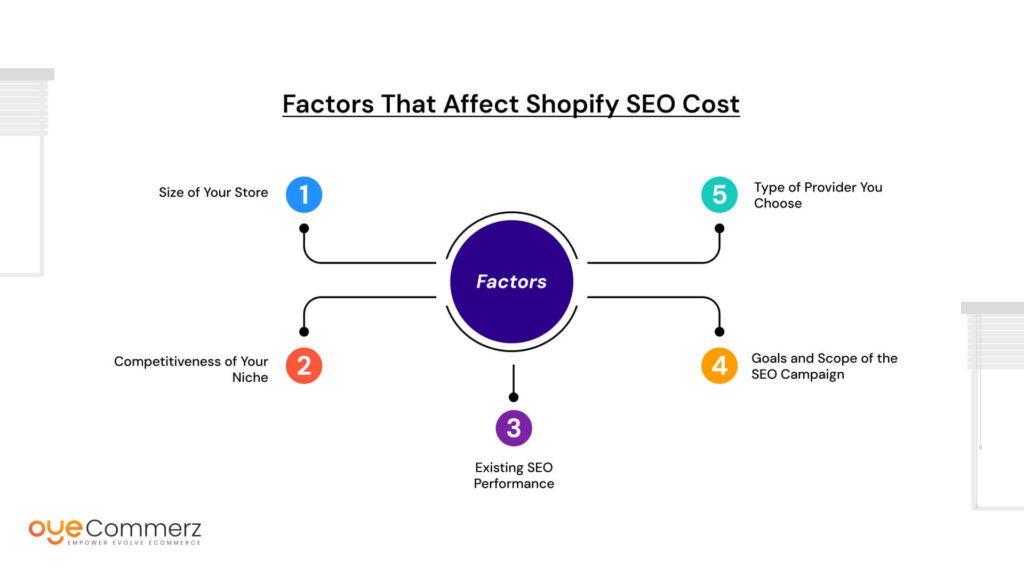
The cost of SEO for a Shopify store can vary significantly depending on several key factors. Understanding these variables can help you set realistic expectations and choose the right level of investment for your business goals.
Size of Your Store
Larger stores with hundreds or thousands of product and collection pages naturally require more time and effort to optimize. Each page needs unique titles, descriptions, and structured content, which increases the overall workload and the cost.
Competitiveness of Your Niche
If you’re in a highly competitive industry like fashion, electronics, or health supplements, SEO will require more aggressive strategies, deeper keyword research, stronger link building, and more content to outrank established competitors. Niche markets with low competition may cost less to rank in.
Existing SEO Performance
Are you starting from scratch, or do you already have some SEO work in place? Stores with zero optimization may need a full audit, technical fixes, and foundational setup, which increases the initial cost. On the other hand, ongoing optimization of an already healthy site can be more cost-efficient.
Goals and Scope of the SEO Campaign
SEO campaigns can range from simple local visibility improvements to complex national or international strategies. The broader your target audience and the more ambitious your goals, the more resources (and budget) will be required.
Type of Provider You Choose
- Freelancers typically offer lower rates but may have limited capacity or specialization.
- Agencies provide a full team of SEO professionals and broader capabilities, but often come at a higher cost.
- In-house teams involve salaries and tools but offer the advantage of long-term brand alignment and control.
Shopify SEO Cost & Pricing Models
Shopify SEO services can be priced in various ways depending on the provider’s structure, the scope of work, and your specific needs. Understanding the most common pricing models can help you choose the right engagement style for your business.
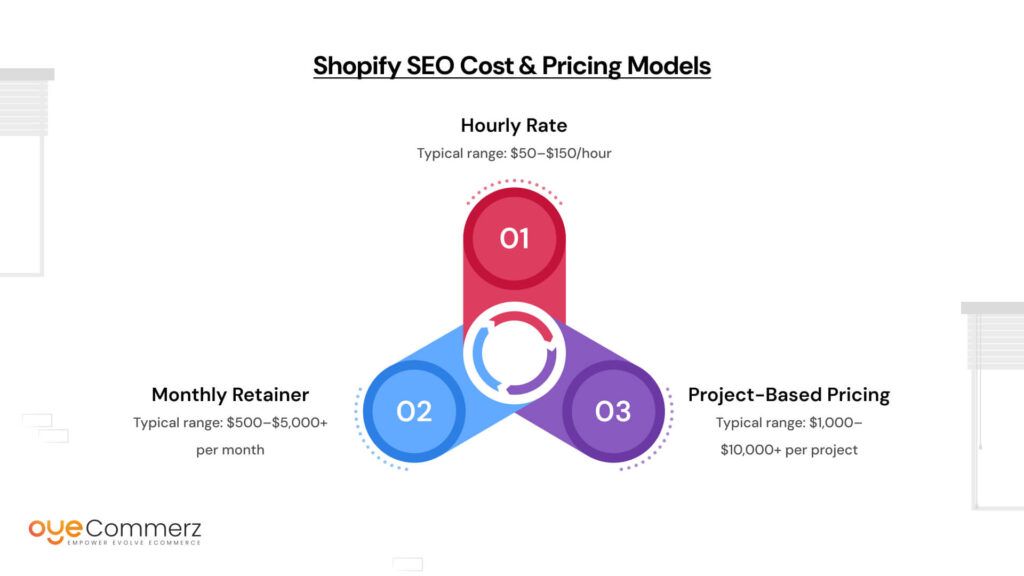
Hourly Rate
Typical range: $50–$150/hour
This model is often used for consulting, audits, or small-scale tasks. It’s best suited for one-off needs or when you’re working with a freelancer or specialist on a flexible basis. For example:
- A Shopify SEO audit might take 10–15 hours, costing $500–$2,250 depending on the provider’s rate.
- Hourly billing may also be used for ongoing advice or troubleshooting technical issues.
Monthly Retainer
Typical range: $500–$5,000+ per month
This is the most common pricing model for ongoing Shopify SEO. You pay a fixed monthly fee for a defined set of services, which often include:
- Keyword tracking and research
- Content creation and publishing
- On-page optimization
- Technical SEO fixes
- Monthly reporting and strategy updates
Larger retainers typically involve more aggressive growth strategies, more content, and more frequent reporting.
Project-Based Pricing
Typical range: $1,000–$10,000+ per project
Project pricing is ideal for clearly defined scopes like an initial SEO setup for a new Shopify store or a complete on-site optimization overhaul. For example:
- A new store SEO setup might cost $1,500–$3,000.
- A larger store optimization project, including content, technical fixes, and strategy development, might range from $5,000 to $10,000 or more.
This model gives clarity on deliverables and budget but is usually time-limited rather than ongoing.
Performance-Based SEO
Pros and cons
In this model, payment is tied to performance such as ranking improvements, traffic increases, or sales growth. While this can seem appealing, there are pros and cons:
- Pros: Low risk upfront, as you pay only for results; incentivizes the provider to perform.
- Cons: Results may take time; some providers may use questionable tactics to deliver quick wins; long-term stability is not guaranteed. Also, performance metrics can be subjective or difficult to attribute directly to SEO.
DIY vs. Hiring an SEO Expert for Shopify
Deciding whether to handle Shopify SEO yourself or hire an expert depends on your time, skill level, and growth goals. Both options have pros and cons, and the right choice often comes down to how much you can realistically take on and the complexity of your store.
What You Can Realistically Do Yourself
If you’re running a small store or just starting out, there are several foundational SEO tasks you can manage on your own, such as:
- Writing unique product titles and descriptions
- Optimizing meta titles and descriptions
- Compressing images to improve site speed
- Creating blog content around relevant keywords
- Submitting your sitemap to Google Search Console
These steps don’t require deep technical knowledge and can significantly improve your store’s visibility when done consistently.
Tools to Support DIY SEO
There are plenty of user-friendly tools that can help you implement and track your SEO efforts:
- Yoast for Shopify (for on-page optimization and readability)
- Ahrefs or Ubersuggest (for keyword research and backlink analysis)
- Google Search Console (to monitor indexing, performance, and fix crawl issues)
- Google Analytics (to track user behavior and conversions)
- Screaming Frog (for technical audits and identifying broken links)
These tools can guide your DIY efforts and help you spot problems before they grow into major issues.
When and Why to Hire a Professional or Agency
As your store grows, so do your SEO needs. It may be time to hire a professional when:
- You’re targeting competitive keywords or niches
- You need help with technical SEO, site structure, or schema markup
- Your store isn’t seeing results despite consistent efforts
- You want to scale content and link-building strategies
- You lack the time to manage SEO alongside other business tasks
An experienced SEO specialist or agency brings expertise, tools, and strategy that can significantly shorten your path to better rankings, more traffic, and higher sales.
Typical SEO Budgets for Different Shopify Businesses
When planning your Shopify SEO budget, it’s essential to align your spending with your store’s size, growth stage, and long-term goals. Below are typical SEO budget ranges based on the stage of your business:
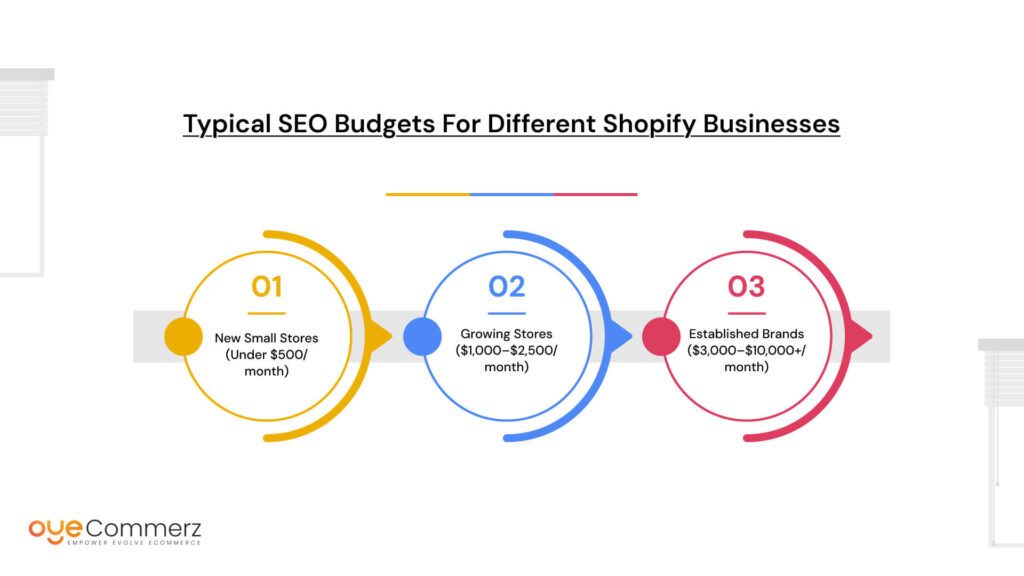
New Small Stores (Under $500/month)
For new Shopify stores or those with a limited budget, SEO efforts are usually more basic. A budget under $500/month is typically enough for foundational work such as:
- Keyword research to identify initial target terms
- On-page SEO for optimizing product pages and metadata
- Basic content creation, like writing product descriptions and creating initial blog posts
- Site speed optimization and basic technical fixes
This budget might be sufficient if you’re focusing on local SEO or niche markets with lower competition. It’s also a good option if you’re considering a freelancer or small agency offering entry-level services.
Growing Stores ($1,000–$2,500/month)
As your store grows and you start generating more traffic and sales, it’s important to expand your SEO strategy. A budget in this range allows for more comprehensive optimization, including:
- Advanced keyword research and targeting more competitive terms
- Ongoing content creation, including blog posts, guides, and product updates
- Link building to improve domain authority and rankings
- Regular technical SEO audits and optimizations
- Conversion rate optimization (CRO) to turn traffic into sales
Stores in this category may benefit from working with an agency that offers a more robust strategy and measurable results.
Established Brands ($3,000–$10,000+/month)
For well-established brands or high-volume Shopify stores, SEO becomes a long-term investment in sustained growth and competitive advantage. Budgets of $3,000 or more per month allow for:
- Comprehensive SEO audits and ongoing site improvements
- Advanced content marketing strategies, such as in-depth blog posts, videos, and infographics
- Extensive link-building campaigns and outreach to high-authority sites
- Technical SEO optimization including schema markup, advanced site structure changes, and mobile optimization
- Targeting national or international markets with multi-language or multi-region strategies
At this level, SEO is treated as a critical component of the overall marketing strategy, and the ROI on this investment can be significant if done well.
How to Evaluate Shopify SEO Providers
Choosing the right SEO provider for your Shopify store can be a critical decision that impacts your long-term growth. To ensure you’re working with a reputable and effective provider, here’s what to look for, the key questions to ask, and the warning signs to watch out for.
What to Look For: Experience, Case Studies, Reviews
When evaluating potential SEO providers, these are the key indicators of their capability:
- Experience: Look for providers who have a proven track record with Shopify stores. Ideally, they should have experience working with businesses in your niche or industry. This ensures they understand the specific challenges and opportunities of your market.
- Case Studies: A reputable provider should be able to share case studies demonstrating past success. These should outline the challenges faced, strategies implemented, and tangible results (like increased traffic or conversions). Avoid providers who can’t back up their claims with real examples.
- Reviews and Testimonials: Check online reviews, testimonials, and even reach out to past clients if possible. Independent feedback will give you insight into how the provider operates, communicates, and delivers results. Look for consistency in positive reviews rather than just a few glowing testimonials.
Questions to Ask Before Hiring
Before making a commitment, ask the following questions to ensure alignment with your business goals:
- What is your experience with Shopify stores?
Ensure the provider has specific experience optimizing Shopify platforms, as Shopify has unique features and challenges that differ from other platforms. - Can you show us any relevant case studies or examples?
Review past work and results from stores similar to yours to get a sense of what the provider can do for you. - What is your approach to keyword research and content creation?
Understand their process for selecting keywords, creating content, and targeting the right audience. They should emphasize a comprehensive strategy and not just focus on ranking for broad terms. - How do you measure success?
Make sure the provider has clear metrics for success traffic growth, conversions, improved rankings, etc. They should have a data-driven approach to measuring SEO success, not just vanity metrics like keyword rankings alone. - What are your communication and reporting practices?
Transparency is key. Ask how often they provide updates, the format of reports, and how they plan to involve you in the process.
Warning Signs of Low-Quality SEO Providers
Not all SEO providers deliver real results. Here are some red flags to watch out for:
- Too Good to Be True Promises: If they promise guaranteed #1 rankings or overnight results, be cautious. SEO takes time and consistent effort; no provider can guarantee instant top rankings.
- Lack of Transparency: If they are vague about their strategies or unwilling to provide clear reporting, it’s a warning sign. A quality provider should be open about what they’re doing and why.
- Black-Hat SEO Tactics: Watch for signs of unethical SEO tactics, such as keyword stuffing, link farming, or hidden text. These can lead to penalties from Google, harming your site in the long run.
No Customization: If the provider offers a one-size-fits-all SEO package without considering your specific business goals, it’s a red flag. SEO should be tailored to your store’s needs, not a generic approach.
Is Shopify SEO Worth the Investment?
Investing in Shopify SEO can deliver significant long-term benefits, but it’s important to understand the potential return on investment (ROI) and the time it takes to see results. When done correctly, SEO can drive high-quality, organic traffic that converts into customers without ongoing ad spend.
Expected ROI from a Well-Executed SEO Strategy
A properly executed SEO strategy for Shopify can lead to a high return on investment, as organic traffic is generally free after the initial investment in optimization. Some key benefits of SEO include:
- Higher Organic Traffic: With the right SEO strategy, your Shopify store can rank for high-traffic keywords, bringing in more visitors who are actively searching for your products.
- Increased Conversions: SEO not only drives traffic but also ensures that the right audience visits your store. Optimizing your content, user experience, and product pages for conversions can lead to higher sales from organic visitors.
- Long-Term Value: Unlike paid ads that stop delivering results once the budget runs out, SEO provides long-term value. Once you rank for a set of competitive keywords, you can continue to see traffic without additional ongoing spend.
A typical ROI can range from 3x to 10x the investment over 6 to 12 months, depending on the competitiveness of your industry and the effectiveness of the strategy.
Timeline for Seeing Results
SEO is a long-term game, and while some changes can yield quick improvements, significant results typically take time. On average, you can expect:
- Initial improvements (in rankings and traffic) within 3 to 6 months if SEO is done correctly. This includes minor ranking improvements and technical fixes.
- Visible organic growth within 6 to 12 months. At this stage, you may see significant increases in traffic, sales, and rankings for your target keywords.
Ongoing refinement after 12+ months, with continued growth and higher ROI. SEO requires constant adjustments, but as your website gains authority and more content is optimized, the results should become more sustainable.
Ready to unlock your Shopify store's full potential?
At Oyecommerz, we specialize in driving sustainable organic growth for Shopify stores. Whether you’re just starting out or looking to scale, our expert SEO strategies are tailored to your business needs. We help eCommerce brands like yours increase traffic, improve search rankings, and boost conversions without relying on expensive ads.
Don’t wait to get the results you deserve. Let’s craft a custom SEO strategy that positions your store for long-term success. Reach out to Oyecommerz today and take the first step toward growing your Shopify store organically!
Let's build your custom Shopify app today!
Conclusion
When choosing an SEO strategy for your Shopify store, it’s essential to align your approach with your budget, business size, and long-term goals. A solid SEO strategy can provide impressive ROI, especially when you focus on high-quality content, user experience, and ongoing technical optimization.
Start small by focusing on the fundamentals, such as keyword research, on-page optimization, and site speed improvements. As your store grows and you see early results, you can scale your efforts by investing in more advanced tactics like link building and content marketing.
Remember, SEO is a long-term investment. Consistency and strategic investment will yield sustainable, organic growth. By choosing the right SEO provider and continuously refining your strategy, you’ll position your Shopify store for success over time.
Frequently Asked Questions
Yes, SEO is absolutely worth it on Shopify. It helps improve your store’s visibility in search engines, drives consistent organic traffic, and reduces dependency on paid ads. With the right SEO strategy, you can attract high-intent shoppers and boost long-term sales.
Shopify SEO costs vary based on your store size, goals, and who you hire. Typical pricing ranges from $500 to $5,000+ per month. Some freelancers charge hourly ($50–$150), while agencies may offer project-based or performance-based pricing as well.
Shopify offers built-in SEO features like editable meta tags, mobile-friendly themes, and clean URLs, but it does not offer managed SEO services. For professional help, store owners typically hire an SEO expert, agency, or use third-party apps.
“Shopify 3 months for $1” is a promotional offer that lets new users access Shopify’s full platform for just $1/month for the first three months. It’s designed to help new store owners get started with minimal upfront cost. Availability may vary based on location and time.

